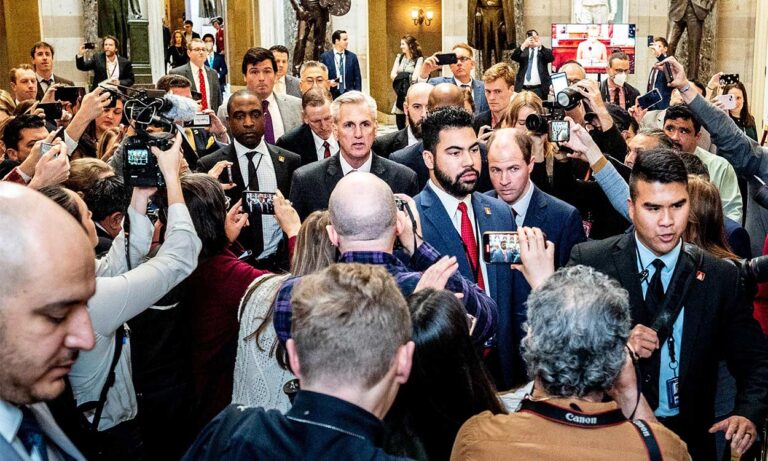Unpacking the cattiest Republican infighting from the US House of Representatives’ leadership race
When watching a highly contested political leadership appointment begins to feel more like an episode of The Real Housewives of Beverly Hills than a pragmatic and important function, you know democracy at its base level is under siege. The ongoing battle to elect a new Speaker of the US House of Representatives has dropped the veil on a number of divisions within the Republican party. So much so, that we felt the need to investigate and shed light on some of the pettiest and most Trump-esque disputes.
Now, while Republican infighting is nothing new, the recent US Speaker election has given us the opportunity to see it fully exposed at the core. It’s evident that former President Donald Trump has had a transformative impact on the Grand Old Party (GOP)—one that’s resulted in greater friction, dirty strategy and a resolute rejection of cooperation.
As emphasised by political publication The Hill, Trump’s influence on Republican rhetoric and policy priority has been insurmountable. And with the orange politician’s agency and authority crumbling around him due to recent legal woes, it’s clear that the conservative right is struggling to find a new leader. Although, as unfortunate as it is, there is still an abundance of loyal supporters pushing his agenda. Can someone please just finally put Trump in prison?
After three days of voting, the 118th Congress made history by failing to elect a House speaker after 11 rounds of voting. As reported by The Guardian, the protracted stalemate marks the first time since 1859 that the House has required more than nine ballots to determine a new speaker.
Who is the frontrunner for the new Speaker of the US House of Representatives?
Since the Republicans regained control of the House—thereby removing Democratic and House Speaker Nancy Pelosi from her position of authority—the GOP have been lining up their top candidates to take over leadership of the second chamber.
So far, the primary front-runner has been long-serving Republican and Californian politician Kevin McCarthy. And while you’d think that he’d be a popular choice among Trump supporters—having previously propped up the rise of radical anti-establishment lawmakers in Washington—it seems as though he’s now become the enemy. McCarthy needs to receive 218 votes to secure victory and, currently, he’s facing dissent from 20 fellow Republicans.
According to CNN, one of the main reasons McCarthy is facing opposition is due to disruptor politicians, all of whom conveniently own a wardrobe full of Make America Great Again (MAGA) merch. However, as was witnessed after Trump’s somewhat limp launch for a 2024 presidential bid, it seems as though Trumpism lives on, even with the absence of the world’s greatest troll himself.
The Never Kevin crew
It only takes five defections from within his own party to lose McCarthy the election and so what started as a typical leadership race has quickly deteriorated into a case of bribery and sordid negotiation.
You can always rely on the US media to conjure up a list of humorous nicknames while in the midst of political turmoil. The Never Kevin crew represents the 20 Republican House members firmly opposed to the Californian politician’s appointment.
19 out of the 20 disruptors come from the Freedom Caucus—a group of ultra-conservative House Republicans that have repeatedly been a source of conflict within the greater GOP collective. According to the BBC, the rebels in the party have suggested that McCarthy is too closely aligned with a broken system and will do little to change how Washington is governed.
They’re demanding a serious disturbance of the status quo—sound familiar anyone?—and have been holding out their support while they try to gain concessions in regard to how bills are brought to the floor as well as demanding personal favours.
The ‘Taliban 20’ have made it their sole mission to block McCarthy’s succession by all means possible and it’s inherently emblematic of the pure chaos erupting within the once considered solid and stoic Republican party.
Regardless of political ideology or persuasion, it’s mind-blowing that these supposedly sanctified and relatively cordial important democratic appointments are now subject to the same level of cattiness witnessed on every season of Below Deck. It looks worryingly similar to how it felt in 2016 when Trump shook the globe and won the Presidency—as though the ship has well and truly sunk.






